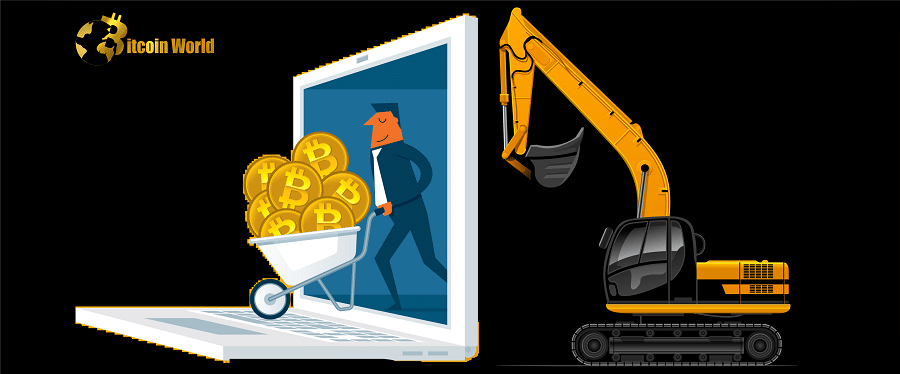The Democratic Republic of the Congo’s Bitcoin mining funds conservation work in Virunga National Park.
Virunga National Park in the Democratic Republic of the Congo is the first to mine Bitcoin to safeguard its forests and animals. Cointelegraph interviewed Big Block Green Services CEO Sébastien Gouspillou, who brought Bitcoin mining to the park.
“Bitcoin mining saved the park from bankruptcy,” Gouspillou smiled through video chat.
Africa’s oldest protected park, Virunga, symbolizes biodiversity. MIT Technology Review journalist Adam Popescu said that the region had problems before Bitcoin mining. The iconic national park has struggled for revenue due to local militias attacking animals and personnel, Ebola outbreaks, and kidnappings.
The park almost died after the COVID-19 epidemic killed visitors to see the gorillas, other animals, and waterfalls. The article stated that tourists accounted for 40% of park earnings.
Gouspillou was moved to aid the park after learning about its troubles. At the end of 2019, he met with the park’s director, Belgian prince Emmanuel De Merode, at a French château. Gouspillou saw the park’s huge potential right away.
To survive, the park might exploit its rich, undeveloped natural resources. Gouspillou showed De Merode how Virunga may profit from Bitcoin mining.
The chateau spoke nonstop. “It must’ve lasted hours,” Gouspillou said. After discussions, follow-ups, and a trip to Congo, De Merode started the mining operation in early 2020 and mined the first coins in September.
Nearly three years later, Bitcoin revenue boosted the park. The park received up to $150,000 a month during the 2021 bull run, nearly covering lost visitor revenue.
Virunga’s Bitcoin mine is a novel way to preserve wildlife and generate cash. Bitcoin mining is energy-intensive, but Virunga’s mine uses green technology amid a green jungle.
The park’s three hydro facilities, which currently power adjacent communities, power the mine. The site employs nine full-time workers who operate jungle miners in shifts. Fearless rangers defend the place, inspiring a Netflix documentary.
Each of the facility’s 10 shipping containers holds 250–500 rigs. Gouspillou has seven containers and Virunga has three. Gouspillou keeps bitcoin and buys electricity from Virunga.
Gouspillou said the Bitcoin mining plant is part of a “global strategy” to generate more power. He said more power plants would be built across the park to power local towns and mine Bitcoin.
De Merode believes the initiative will succeed despite the weak market. Indeed, numerous Bitcoin miners fell victim to the 2022 weak market, but De Merode is unique: the park generates Bitcoin using spare energy to monetize something that has no value.
If De Merode dies in combat, Bitcoin and private keys won’t disappear. Since 1996, almost 200 park rangers have died, and De Merode was shot twice while driving to Goma in 2014.
The park’s financial crew holds the Bitcoin wallet and sells mining money to maintain the park. De Merode said:
“It’s unlikely we’ll sit on Bitcoin for more than a few weeks anyway because we need the money to run the park. So if something happened to me or our CFO lost the password, we’d give him a hard time—but it wouldn’t cost us much.”
De Merode’s “bet” has drawn criticism from conservationists, like El Salvador’s mainstream media coverage. De Merode first used “blockchain mining” instead of “Bitcoin mining” since it was more PR-friendly, according to Gouspillou.
Gouspillou hasn’t seen a disadvantage to how a Bitcoin mine helped a national park:
“It’s really hard to find a negative side to this story. There’s nothing. The energy is clean, even the ASICS — we will recycle them when they come to the end of their lifespan by distributing them across African communities.”
Bitcoin miners are ASICS. ASICS guesses the next Bitcoin block on the Bitcoin time chain every 10 minutes in a computerized lottery. Gouspillou said these computers will be disassembled and repurposed to avoid e-waste. De Merode protects animals with extra, clean energy from miners.
Gouspillou is eyeing further sub-Saharan African bitcoin mining operations after his Congo success. He joined the group that visited the Central African Republic, the second country to legalize Bitcoin.
Bitcoin mining initiatives employing renewable energy in Africa are expanding. Bitcoin mining is happening everywhere, from Kenya’s highlands to Malawi’s tropical climate.
Cointelegraph blogger and Bitcoin mining expert Magdalena Gronowska explained:
“Miners are buyers of first resort (always want to run) and last resort for overproducing energy locations to become economically viable. As consumer demand grows in a community, Bitcoin mining can be decreased or removed entirely, but it enabled critical infrastructure to be built out.”
Bitcoin mining may be profitable in areas with stranded or overproduced electricity.
The park requires funding and investment. Conflicts and limited tourism will keep the Congolese government’s operating budget around 1%. Bitcoin mining can provide cash to safeguard the park and its species for years, according to Gouspillou.
Disclaimer: The information provided is not trading advice, Bitcoinworld.co.in holds no liability for any investments made based on the information provided on this page. We strongly recommend independent research and/or consultation with a qualified professional before making any investment decisions.

